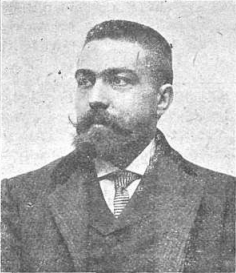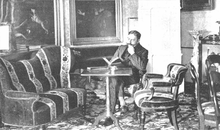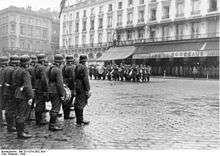Joan Roca i Caball
Joan Baptista Roca i Caball (1898–1976) was a Catalan Carlist and Christian-Democratic politician. He is known as co-founder of Unió Democràtica de Catalunya and recognized as representative of a "Third Spain", the group which emerged during the Spanish Civil War and claimed to have stood in-between the warring factions. He is also counted among leaders of the Catalan opposition to Francoism.
Joan Roca i Caball | |
|---|---|
| Born | Joan Roca i Caball 1898 |
| Died | 1976 Barcelona |
| Nationality | Spanish |
| Occupation | insurance agent |
| Known for | politician |
| Political party | CT, UDC |
Family and youth
The Roca family has traditionally owned vineyards in the Barcelona province; heavily hit by the phylloxera plague in the mid-19th century, it was driven out of business.[1] Joan's paternal grandfather, Antonio Roca Calvet (1840-1917),[2] inherited nothing but clothes and had to build his position in mid-ranks of the Barcelona bourgeoisie,[3] the task facilitated by his marrying into an established Masferrer family.[4] His son and Joan's father, Ramon Roca Masferrer (1861-1932),[5] became a prestigious personality within the realm of Barcelona editors, arts and culture. He is best known as co-founder and one of the key people behind Instituto Catalán de las Artes del Libro (also known as Societat de les Arts del Llibre), an organization of Barcelona publishers; he was member of its managing board.[6] Apart from typical corporative activities Instituto managed a school and published reviews and other prints itself, contributing in particular to development of the Catalan graphical art.[7] Roca Masferrer was also engaged in charity, active in Centro Benéfico Social Parthenon[8] and Centro Católico Obrero,[9] the interest passed later on to his offspring. He married María Baus Rocabruna, with whom he had 3 children. Widowed in 1894,[10] in 1895 he married María Caball Fargas (1862-1938);[11] the couple settled in the university quarter at the intersection of Rosellon and Aribau streets;[12] they had two children, Joan and Trinidad.[13]
The young Joan received his first education in the very prestigious Barcelona Jesuit college known as Colegio de Caspe; he entered the school in 1908 and received his bachillerato in 1914.[14] The same year he entered Faculty of Law at the University of Barcelona, where he joined as unenrolled student.[15] During his studies he worked in an unnamed "oficina comercial" and practiced law as an intern in the office of Salvador Ariza and in the civil section of the municipal court of the Hospital district, where he served as a secretary.[16] Brought up in fervently Catholic ambience, he also engaged in lay Catholic and charity organizations, like congregations of Sant Joan Berchmans and the Immaculada, acting as a catechist in the nearby Centre Montserrat-Xavier.[17] The exact year of his graduation is unclear, though in 1921 he is known as already pursuing a law career on his own.[18] In 1923 he married Montserrat Junyent Quintana (1905-1985),[19] daughter of Miguel Junyent Rovira, the leader of Catalan Carlism and editor-in-chief of the daily El Correo Catalan.[20] The couple had 7 children, 5 daughters, and 2 sons. One of them, Miquel Roca i Junyent, was active in anti-Francoist opposition and made his name nationwide as a moderate Catalanist politician; he is considered one of the fathers of the 1978 Spanish constitution. Apart from being a scholar, he is also heading a major law firm,[21] considered one of the most influential ones in Spain.[22] Montserrat Roca Junyent was distinguished figure in the realm of Catalan librarians and archivists.[23]
Carlist
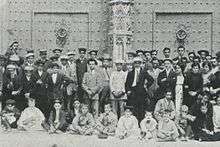
Joan's father sympathized with possiblist republicanism and moderate Catalanism;[24] approaching Unió Catalanista, he was member of the local Centre Catalá Autonomista, which later adhered to Lliga Regionalista.[25] Joan's maternal ancestors were distinguished by loyalty to the ultra-reactionary Carlist cause. It was the influence of his mother and maternal relatives, especially his older cousin Joan Viza Caball, which prevailed when forming the young Joan;[26] as a teenager he engaged in the mainstream Carlist branch, at that time known as Jaimismo. Around 1914 he joined the local Circulo Jaimista at calle de la Puertaferrisa.[27] During his academic years he entered the local branch of Agrupación Escolar Tradicionalista, the Carlist student organization.[28] In the early 1920s he was already one of the most dynamic regional party activists of the young generation, becoming member of Junta Directiva of the local circle, secretary of Junta Regional Tradicionalista of Catalonia[29] and president of the Barcelona AET.[30]
The 1923 coup of Primo de Rivera produced dissolution of all parties and brought national political life to a standstill. With Jaimist structures dormant Roca turned towards non-political Carlist activities and commenced co-operation with the Catalan party daily. As Correo Catalan was managed by his father-in-law, Roca became first secretary of the editorial board and later started to contribute himself. He specialized in commentaries on foreign politics; as his position grew, in the mid-1920s he started to write editorials; he usually signed as "Daniel Castells" and "Snomen".[31] Junyent was known for his moderate sympathy for Catalanism[32] and at that time also Roca's Carlism was assuming an increasingly pro-Catalan tone,[33] though he did not join those who abandoned the movement to join Acció Catalana.[34] His original Traditionalist vision was diluted further on by social-Catholic threads, as he approached Acción Social Popular and its periodicals.[35] His charity engagements were gradually turning him against the regime; forming the circle of Josep Pedragosa Monclús he focused on prison inmates and became member of the Barcelona Junta del Patronato de las Prisiones.[36]
In the late 1920s Roca formed part of an informal Jaimist nationwide network known as "La Protesta"; some scholars claim that together with Melchor Ferrer and Pedro Roma he led the Barcelona cell.[37] Formed mostly by the youth, the grouplets engaged in conspiracy against the regime. Its format emphasized mobilization and search for wider social basis rather than anti-primoderiverista activities, though at one point the Barcelona hotheads considered staging a coup in La Seu d'Urgell.[38] "La Protesta" was somewhat at odds with generally passive policy of the Carlist executive[39] though not necessarily with position of the claimant; since 1926 openly opposing Primo, in his Paris residence Don Jaime remained in touch with the Catalanist and liberal exiles.[40] During Berenguer's dictablanda, Roca decided to actively re-enter official politics; in the last elections of the monarchy in April 1931 he co-ordinated party campaign in the Tarragona province[41] and unsuccessfully tried his luck as a Traditionalist candidate to the local Sarrià council.[42]
Between Carlism and Christian Democracy

After the fall of Alfonsine monarchy and declaration of the Second Spanish Republic Roca held high position within Carlist structures; he was member of the Catalan party executive, Junta Regional, serving as its secretary.[43] During gear-up to the Cortes Constituentes electoral campaign of June 1931 he negotiated with the conservative Catalanist La Lliga about building a right-wing alliance list in the region. Together with Francisco Gambús and Juan Soler Janer, Roca was one of 3 Carlists forming a joint Carlist-Lliguist candidature;[44] he competed in the Tarragona district. The bid bore no fruit and Roca suffered heavy defeat; with the leading contender getting 67.000 votes and the last candidate elected earning 22.000 votes, Roca enjoyed support of only 9.000 voters.[45]
The question of Basque and Catalan autonomy, which occupied much of the public agenda in the summer of 1931, proved a difficult one for the Carlists. Though supporting separate traditional provincial establishments has always been a fundamental part of their program, they were anxious that autonomy might turn into a vehicle of promoting peripheral nationalisms and left-wing ideologies. The original highly federative Carlist draft of Catalan autonomy, produced in 1930, was shelved;[46] the move prompted frustration of highly pro-Catalanist Carlists; disappointed, Roca resigned from the posts held.[47] Though eventually the Carlists half-heartedly decided to support the official autonomy scheme,[48] Roca concluded that his vision of Catalan future was no longer compatible within the Traditionalist format.[49]
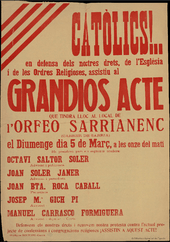
Together with a group of young Carlists[50] Roca got in touch with offshoots from Acció Catalana[51] and encouraged by his old-time mentor, a Capuchin friar Miquel d'Esplugues, in November 1931 he co-founded Unió Democrática de Catalunya.[52] Along Josep Cirera Soler and Lluis Vila d'Abadal he was among those most responsible for its manifesto;[53] it identified UDC as a Christian-democratic party advocating Catalonia within the future Iberic Confederation.[54] The move marked a dramatic rupture with Traditionalism; instead of its ultra-reactionary, monarchist, antidemocratic, fanatically Catholic outlook, Roca accepted the Republican regime, democratic principles and a democristiano format of religiosity.[55] Scholars consider his approach non-sectarian, conciliatory and moderate.[56] Roca entered top executive bodies of UDC[57] and emerged as one of its 3 key personalities.[58]
In the 1932 campaign to Catalan parliament UDC underlined 4 features: loyalty to the Republic,[59] support for autonomous Catalonia,[60] social-Catholicism[61] and the principle of religious freedom, the last one somewhat at odds with militantly secular course of the Republic.[62] The party strove to build a broad-base center coalition named "Concòrdia ciutadana"; for reasons which are not clear, Roca did not run,[63] though he was one of the most active party speakers.[64] In general elections of 1933 Unió refused to join the CEDA-led right-wing block[65] and attempted to mount another moderate alliance, but negotiations with La Lliga failed. UDC fielded a stand-alone list with 4 candidates, including Roca, in the Barcelona Ciudad district.[66] All of them lost and 2.700 votes gathered by Roca[67] demonstrated that the party was a second-rate grouplet, with membership reduced to few thousand.[68]
The Third Spanish Republic
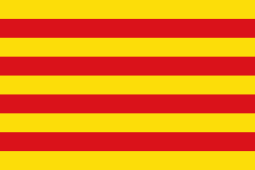
While the country was undergoing rapid political polarization Roca and UDC tried to keep off what they considered extremes.[69] Having earlier dismissed CEDA as an alliance partner, during talks preceding the 1936 electoral campaign Unió rejected also the offer of Companys, which consisted of few places on the Catalan Frente Popular list; they claimed that Christians could not join the Marxists.[70] Eventually, UDC did not field any candidates. Until the July 1936 coup Roca kept advocating Christian Catalanism,[71] though when discussing threats he stressed a fascist menace rather than a proletarian revolution.[72] After outbreak of the Civil War the party remained loyal to the Republic. When in August the Generalitat security[73] launched their search of Roca, result of confusing different members of the family,[74] he volunteered to Commisaria General d'Ordre Públic and was detained for 2 weeks. Released, he concluded that remaining in the increasingly chaotic Republican zone posed a mortal threat;[75] he resigned from public functions[76] and in December 1936 the entire family, escorted by the Generalitat police,[77] crossed the French frontier.[78] They settled in Paris; in financial dire straits, Roca tried to earn a living by teaching Catalan.[79]
In February 1937 Roca co-founded Comité pour la paix civile et religieuse en Espagne and became its secretary.[80] The organization posed as representing "Tercera España", siding with none of the warring parties and mobilizing international support for truce based on mutual compromise.[81] As back in Spain UDC remained loyal to the Republic and even recruited its own party volunteer battalion,[82] to sustain his "Third Spain" identity Roca distanced himself from ongoing party activities.[83] In practical terms, the Comité endorsed a democratic republic deprived of militant secularism;[84] it spoke against European non-intervention in favor of "intervenció mediadora".[85] In April 1938 the Comité produced an own armistice draft;[86] later it was increasingly focusing on humanitarian issues.[87] Roca remained active and indeed animated a number of likewise initiatives, e.g. similar committees in other countries[88] or separate Comité Catala per a la Pau Civil i Religiosa.[89] However, he was not among leaders of Comité d'action pour la paix en Espagne, an initiative deprived of the confessional ingredient.[90] It is not clear whether he visited the Republican zone.[91] Serrano Suñer in name of the Franco government named his efforts "maquinaciones" and declared him "separatista".[92]
After the end of hostilities Roca's public activity was reduced to organizing assistance for refugees from the Republican zone, massively fleeing into France;[93] none of the sources consulted claims he was engaged in political activities of the Republican exiles. In late 1939 the Roca family - still in difficult financial conditions - moved away from Paris and settled in Bordeaux, where they were offered hospitality in a house of distant family relatives, the building left entirely at their disposal.[94] In late 1940, already after the city had been occupied by the Germans, his wife and two children transferred to Spain. As she developed serious health problems, Roca decided to take the risk and join her; in May 1942 he returned to Barcelona.[95]
Early Francoism
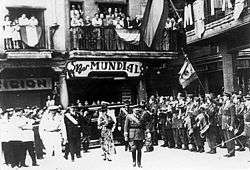
Upon return Roca was questioned by the security. Released, he was required to show up at a police station periodically, the obligation lifted some time afterwards.[96] Taking advantage of his pre-war connections with Catholic activists now highly positioned in business, he commenced working for insurance companies like La Previsión Española, Compañía Hispano-Americana de Seguros y Reaseguros and Compañia de Seguros Cervantes. His business role is not clear; a later police document identified him simply as an insurance agent.[97] Due to his corporate engagements in the mid-1940s Roca lived permanently outside Catalonia, mostly in Bilbao, San Sebastián and Madrid; he settled at Carrer de Madrazo in Barcelona as late as in 1946. Continuing with insurance engagements, at that time he also entered the managing board of Fosforera Española.[98]
Having returned to Spain Roca joined UDC members acting in secrecy under circumstantial names, like Creus de Sang.[99] Some scholars count him, along Miquel Coll i Alentorn, Pau Romeva and Maurici Serrahima, as one of the party leaders.[100] Their strategy consisted of staying clear of official political life, focusing on elites, marketing cultural orientation of Catalan nationalism and playing the Catholicism card.[101] Activity of the group was very much formatted as cultural and scientific initiatives, usually associated with the re-created Instituto de Estudios Catalanes; Roca became vice-president of the associated Sociedad Catalana de Estudios Jurídicos, Economicos y Sociales.[102] They also assumed religious shape; Roca was on friendly terms with many members of the Spanish ecclesiastical hierarchy[103] and with some in the Vatican.[104] A few of these enterprises turned into major public events, like the 1947 enthronement of the Montserrat Virgin.[105] Conducted partially in Catalan, it endorsed the spirit of post-war reconciliation; though refraining from anti-Francoist tones, the event proved to have been a hard test for the official authorities.[106]
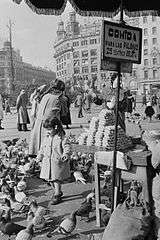
In the 1950s UDC resumed more structured clandestine organizational life.[107] With theoretically supreme governing body Consell Nacional meeting once a year,[108] it empowered Commissió Permanent - Roca its member - to act in-between the sessions.[109] Since 1945 allowed to travel abroad Roca became active in the world of European Christian Democracy network; in 1950 UDC applied for membership in Nouvelles Equipes Internationales, later Union européenne des démocrates-chrétiens.[110] His role on the international arena was made easier as Roca knew many European democristianos from Secretariado Internacional de los Partidos Democráticos de Inspiración Cristiana[111] and remained within the circle of Maritain's followers.[112] The 1952 Eucharistic Congress, staged in Barcelona, turned into a major success of the UDC activists; working extensively to prepare its agenda, Roca persuaded ecclesiastical hierarchs to drop pro-Francoist tones.[113] Security services of the regime were aware of his activities,[114] though he was spared heavy repressive measures; once briefly detained, he was questioned by the police also in few other cases.[115] On the other hand, in the mid-1950s he already enjoyed a fairly prestigious status in the Barcelona societé, acknowledged by official press in the "sociedad" columns.[116]
Middle and late Francoism
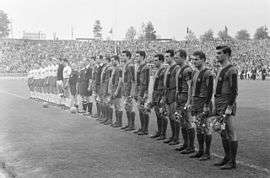
In the late 1950s UDC was in impasse; Roca is credited for overcoming the crisis.[117] As the regime assumed more liberal shape, at the turn of the decades the UDC activists took to more open forms of activity. In the early 1960s they launched new periodicals,[118] either on clandestine or semi-clandestine basis.[119] Roca himself focused on collaboration with Criterion, an official Barcelona-based Catholic review with Christian-democratic and pro-Catalanist penchant;[120] on the other hand, he stayed clear of more fundamentalist Christian reviews like Cristianidad, also issued in the Catalan capital.[121] He was among most active "conferenciants", giving lectures which promoted Catalan and Christian values. Initially delivered privately, gradually they were hosted also by various institutions.[122] Roca himself was the most frequent guest at the Barcelona Franciscalia,[123] though he promoted Catalan culture also at unlikely locations like sport circles.[124] Since the 1960s he started to sign open letters, protesting suppression of Catalan culture, crackdown on student groupings and measures against the dissenting clergy;[125] in the mid-1960s he joined the "Volem Bisbes Catalans" campaign.[126] On the list of suspects, maintained by the Francoist security, he was classified as "catalano-separatista".[127]
Active in the fields of charity, culture[128] and religion, Roca earned most prestigious position in the realm of Catalan sport. Though not a sportsman himself, already in the mid-1930s he grew into the presidency of Federación Catalana de Fútbol and became secretary general of the football club FC Barcelona.[129] Due to his sensitive political standing he was not in position to resume the duties during initial decades of Francoism, but in the early 1960s he re-entered the executive of Mutua del C. de F. Barcelona. In 1963 he is first reported as vice-president of the already iconic Catalan club[130] and retained this position at least until the very late 1960s;[131] in the early 1970s he was noted as elected to Junta Directiva of the club, though not as a VP anymore.[132]
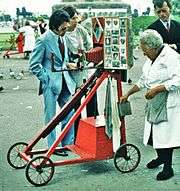
In 1967 Roca replaced Pau Romeva as head of Commissió Permanent.[133] This change coincided with revision of the hitherto party's alliance strategy. Though Unió recurrently defended attempts to create more unitary platforms of political opposition,[134] it remained highly cautious about entering initiatives which hosted also parties of extreme left; under the new Roca leadership UDC joined ranks with PSUC in Commisió Coordinadora de Forces Politiques de Catalnuya.[135] Apart from traditional Catalanist and Christian-democratic profile, the grouping adopted also some social-democratic tones[136] and assumed a decisively pro-EEC stand.[137] During late Francoism UDC emerged as one of more popular Catalan groupings, its moderate Christian-democratic and nationalist profile appealing to Catalan bourgeoisie.[138] At that time already advanced in age and suffering from deteriorating health, Roca ceded many roles to his son, Miquel. He was unable to attend the first official national congress of UDC, staged in 1976[139] and passed away shortly afterward due to pulmonary edema.[140]
Footnotes
- see the montorfano service, available here
- La Vanguardia 01.10.17, available here
- Antoni Roca Calvet entry at MyHeritage service, available here
- he married Carmen Masferrer Flotats, see Carmen Roca (born Masferrer i Flotats) entry at MyHeritage service, available here
- see Ramon Roca i Masferrer entry at MyHeritage service, available here
- La Vanguardia 05.02.03, available here
- see Institut Català de les Arts del Llibre entry at Gran Enciclopedia Catalana online service, available here
- La Vanguardia 14.02.23, available here
- La Vanguardia 18.03.21, available here
- see Maria Roca (born Baus i Rocabruna) entry at MyHeritage service, available here
- see Maria Roca Masferrer (born Caball Fargas) entry at MyHeritage service, available here, La Vanguardia 29.01.95, available here
- Miquel Coll i Alentorn, Una obra política coherent i honrada, [in:] Miquel Coll i Alentorn, Escrits polítics, cívics i religiosos, Barcelona 1993, ISBN 8478264744, p. 185, first published in Oriflama 166 (1976)
- La Vanguardia 08.12.51, available here
- Joaquim Ventalló i Vergés, Roca y Caball, un hombre de una pieza, [in:] La Vanguardia 27.08.76, available here
- Coll i Alentorn 1993, p. 185
- Coll i Alentorn 1993, p. 185
- Coll i Alentorn 1993, p. 186
- Hilari Raguer i Suñer, La Unió Democràtica de Catalunya i el seu temps (1931-1939), Barcelona 1976, ISBN 9788472022638, p. 86; during the dictatorship, dictablanda and the republic Roca worked for Unió de Productors de Filferro i Derivats, later transformed into Central Catalana de Trefileria
- see Maria Roca i Caball (born Junyent Quintana) entry at MyHeritage service, available here
- Coll i Alentorn 1993, p. 186
- see corporate Roca Junyent service, available here
- Roca Junyent, despacho más influyente de 2014, [in:] Noticias Juridicas 22.05.15, available here
- see Homenatge a Montserrat Roca Junyent bibliotecària de l'Escola amb motiu de la seva jubilació: 28 d'octubre 1992, [in:] Universitat Politecnica de Catalunya service, available here
- mixing with the likes of Pau Font de Rubinat, Albert Bastardas i Sampere and Emili Junoy i Gelabert
- Coll i Alentorn 1993, p. 185
- Raguer i Suñer 1976, p. 96
- Ventalló i Vergés 1976
- La Vanguardia 27.08.76, available here
- Coll i Alentorn 1993, p. 186
- Ventalló i Vergés 1976
- Coll i Alentorn 1993, p. 186, Raguer i Suñer 1976, p. 96
- as opposed to other Catalan Carlist politicians of the early 20th century like Dalmacio Iglesias García, who vehemently confronted emerging Catalanism
- already in 1922 he took part in Conferencia Nacional Catalana, Coll i Alentorn 1993, p. 186
- like Lluís Vila i d'Abadal
- first El Social and later Catalunya Social, Coll i Alentorn 1993, p. 186; for detailed discussion on Acción Social Popular see La Accion Social Popular de Barcelona, [in:] Revista española de la opinión pública 15-16 (1969), pp. 68-75
- Coll i Alentorn 1993, p. 186-7; he performed the role for some 15 years, until he resigned in November 1936 shortly before leaving for France, see La Vanguardia 18.11.36, available here
- Jordi Canal, El carlismo, Madrid 2000, ISBN 8420639478, p. 285; other scholars do not list Roca as leader of the group and note the names of Ferrer and Antonio Oliveras, see Robert Vallverdú i Martí, El Carlisme Català Durant La Segona República Espanyola 1931-1936, Barcelona 2008, ISBN 9788478260805, p. 19
- in 1928, see José Carlos Clemente Muñoz, El carlismo en el novecientos español (1876–1936), Madrid 1999, ISBN 8483741539, p. 74, Vallverdú i Martí 2008, p. 19. The Madrid cell was led by Francisco Carlos Melgar; other grouplets were active also in Vascongadas, Navarre and Aragon
- some authors claim that the Catalan leadership was aware of its activities but preferred not to intervene, Vallverdú i Martí 2008, p. 19
- Canal 2000, p. 285
- Vallverdú i Martí 2008, p. 71
- Coll i Alentorn 1993, p. 187, Joan Auladell i Fonseca, El dir i el fer. Una aproximació a la história d'Unió Democrática de Catalunya, s.l. 2006, p. 6. Following failed negotiations with La Lliga, the Carlists decided not to field their own candidates in Barcelona. The Sarriá borough was an exception; Roca has earlier gained some notoriety for defending autonomy of the area within a new Barcelona administrative system, Vallverdú i Martí 2008, p. 71
- the Junta was headed by Roca's father-in-law, Junyent, Vallverdú i Martí 2008, p. 70
- La Vanguardia 24.06.31, available here, also Vallverdú i Martí 2008, p. 83
- La Vanguardia 03.07.31, available here
- named Proyecto de Estatuto de Cataluña, see Vallverdú i Martí 2008, p. 95; for the full text see Juventudes Carlistas service available here
- Vallverdú i Martí 2008, p. 97, Raguer i Suñer 1976, p. 80, Auladell i Fonseca 2006, p. 7
- Canal 2000, p. 290
- Vallverdú i Martí 2008, p. 97
- like Josep Cirera Soler, Josep Trias Peitx, Josep Farré Moregó, Esteve Farré Calveras, Antoni Oliveras
- like Lluis Vila d'Abadal, Pau Romeva, Ramon Sunyer, Maurici Serahima
- Canal 2000, p. 290; according to some scholars, UDC was "nationalist child of Carlism", Josep Carles Clemente, Los días fugaces. El Carlismo. De las guerras civiles a la transición democratica, Cuenca 2013, ISBN 9788495414243, p. 82
- signed by 18 individuals, Raguer i Suñer 1976, p. 92
- or Iberian Confederation, in original "Confederació Ibèrica", see Eduardo Montagut, La creación de Unió Democràtica de Catalunya, [in:] Nueva Tribuna 11.01.16, available here
- Raguer i Suñer 1976, p. 80
- Coll i Alentorn 1993, p. 187
- the names listed by scholars are Comité de Govern, Junta Directiva and especially a small, 5-member executive named Comité d'Acció Politica, see Raguer i Suñer 1976, pp. 172, 223, Coll i Alentorn 1993, p. 188, Auladell i Fonseca 2006, p. 10
- along Vila d'Abadal and Pau Romeva, Raguer i Suñer 1976, p. 97, also Oscar Barberà i Aresté, Alianzas políticas, relaciones de poder y cambio organizativo: el caso de Unió Democràtica de Catalunya, 1978-2003, Barcelona 2011, ISBN 9788474765687, p. 47
- though some scholars claim that Roca and UDC were accidentalists, i.e. considered republic v. monarchy question secondary, compare José Luis Orella Martínez, Las raíces Carlistas de lal Democracia Cristiana, [in:] Aportes: Revista de historia contemporánea 14/40 (1999), p. 115
- he declared that "el text de d'Estatut és sagrat" and constitutes "expressió de la voluntat del nostre poble, únic sobirá dels seus destins", quoted after Raguer i Suñer 1976, p. 134
- Raguer i Suñer 1976, pp. 169-9
- in 1932 Roca intervened with the authorities, defending religious rights of the Catholics, Miguel Batllori, Víctor Manuel Arbeloa, Església i estat durant la Segona República Espanyola, 1931-1936, Barcelona 1977, ISBN 9788472021488, p. 276
- Raguer i Suñer 1976, p. 158
- sometimes speaking at two gatherings in one day, like on November 12, 1933, Raguer i Suñer 1976, p. 178
- UDC indirectly alluded to CEDA-led right-wing alliance as "feixista", Raguer i Suñer 1976, p. 172
- Raguer i Suñer 1976, p. 174, La Vanguardia 18.11.33, available here
- Raguer i Suñer 1976, p. 184, Barberà i Aresté 2011, p. 40. The Carlists in their post-electoral analysis attributed their poor showing to many voters having been distracted by Roca and his candidature, Vallverdú i Martí 2008, p. 121
- Raguer i Suñer 1976, p. 273
- Raguer i Suñer 1976, pp. 224-237
- Paul Preston, Las Tres Españas, ISBN 9788499891392, Madrid 2011, p. 4, also Hilari Raguer, El meu J.B. Roca i Caball (1898-1976), [in:] El Matí 29.01.13, available here
- In May he was about to enter a commission of the forthcoming Congreso Juridico, entrusted with working out division of competences between Generalitat and Madrid, La Vanguardia 16.05.36, available here; on July 13 he advocated primary education in Catalan, La Vanguardia 14.07.36, available here
- La Vanguardia 31.03.36, available here
- "policia normal", Raguer i Suñer 1976, p. 393; it is not clear what is meant by this term; probably the unit in question was Mossos d'Esquadra, the regular uniformed police service maintained by the Catalan autonomous government
- Joan Bautista Roca i Caball was mistaken for Josep Maria Batista i Roca, Raguer i Suñer 1976, p. 393
- Roca's father-in-law fell victim to the unfolding violence. Having learnt the news about Republican repression, especially execution of the Catalan Carlist leader Tomàs Caylà, Miguel Junyent died of heart failure. Accidentally, the following day the Republican militia unit arrived at his flat; they were visibly disappointed they could have not executed Junyent. One of them asked "por qué no le damos el tiro de gracia?"; Roca's wife was present at the scene, see the paragraph To re-kill the dead in José María Zavala, Los horrores de la Guerra Civil: Testimonios y vivencias de los dos bandos, Madrid 2011, ISBN 9788499890821, page not available, see here
- e.g. this of secretary of Comité de servicios correccionales de Cataluñya, La Vanguardia 18.11.36, available here; he was also vice-president of Sociedad para la difusión del libro catalán, La Gaceta de las artes gráficas August 1936, available here, and secretary of CF Barcelona football club
- some authors claim that Roca received threats from the anarchists, Hilari Raguer i Suner, La Iglesia durante la Segunda Republica y la Guerra Civil, [in:] Paul Aubert (ed.), Religión y sociedad en España (siglos xix y xx): Seminario celebrado en la Casa de Velázquez (1994-1995), Madrid 2002, ISBN 9788495555281, p. 52
- Raguer i Suñer 1976, p. 394
- Auladell i Fonseca 2006, p. 41
- Raguer i Suñer 1976, p. 443
- Raguer i Suñer 1976, p. 444
- La Vanguardia 19.01.39, available here
- UDC kept voicing against "international fascism", for 1937 see La Vanguardia 17.06.37, available here, for 1938 see La Vanguardia 10.09.38, available here
- Raguer i Suñer 1976, p. 445
- Raguer i Suñer 1976, p. 454. The propaganda of founded Comité was not directly anti-Nationalist, but its line clearly contrasted with efforts of the Nationalist propaganda in France, which aimed at diverting the threat of co-ordinated international intervention, Raguer i Suñer 1976, p. 463
- Auladell i Fonseca 2006, p. 41
- Raguer i Suñer 1976, p. 511
- Raguer i Suñer 1976, p. 446, Auladell i Fonseca 2006, p. 41
- set up in mid-1938, Raguer i Suñer 1976, p. 503
- Raguer i Suñer 1976, p. 446
- some authors hint that Roca might have visited Catalonia in early 1937 to attend the funeral of Carrasco i Formiguera , Hilari Raguer, Gunpowder and Incense: The Catholic Church and the Spanish Civil War, London 2007, ISBN 9781134365937, p. 175
- Arnau Gonzàlez i Vilalta, Enric Ucelay-Da Cal, Contra Companys, 1936: La frustración nacionalista ante la Revolución, Valencia 2012, ISBN 9788437089157, p. 345
- Auladell i Fonseca 2006, p. 50
- Coll i Alentorn 1993, p. 190
- Auladell i Fonseca 2006, p. 51; one work claims he returned in May 1941, Coll i Alentorn 1993, p. 190
- Coll i Alentorn 1993, p. 190
- La llista completa: els 462 catalans vigilats per franquisme, [in:] Sapiens service, available here
- Coll i Alentorn 1993, p. 190
- Auladell i Fonseca 2006, p. 50
- Joan B. Culla, Unió Democrática de Catalunya: Le parti démocrate-chrétien catalan (1931-1989), [in:] ICPS Working Papers 27 (1990), p. 4; others fail to mention his name when listing key protagonists, see Casilda Guell Ampuero (ed.), The Failure of Catalanist Opposition to Franco (1939-1950), Barcelona 2006, ISBN 9788400084738, p. 146
- Guell Ampuero 2006, pp. 146-7
- in 1951, Josep M. Ainaud de Lasarte, Societat Catalana d'Estudis Jurídics, Econòmics i Socials, [in:] Anuari de la Societat Catalana d'Economia 1 (1979), p. 15
- during his Republic days and in exile he worked with Vidal y Barraquer and his entourage
- like Iginio Giordani
- Auladell i Fonseca 2006, p. 48
- Auladell i Fonseca 2006, pp. 47-48
- Culla 1990, p. 4
- Auladell i Fonseca 2006, p. 51
- Auladell i Fonseca 2006, p. 52
- Montserrat Guibernau, Catalan Nationalism: Francoism, Transition and Democracy, London 2004, ISBN 9781134353262, p. 135
- Oscar Barberà i Aresté, Alianzas políticas, relaciones de poder y cambio organizativo: el caso de Unió Democràtica de Catalunya, 1978-2003, Barcelona 2011, ISBN 9788474765687, p. 45
- Raguer 2007, p. 245
- Auladell i Fonseca 2006, p. 49
- Hilario M. Raguer Suñer, Gaudeamus Igitur: notes per a una història del "Grup Torras i Bages" : documents i records, Barcelona 1999, ISBN 9788484151517, pp. 112-3
- Coll i Alentorn 1993, p. 190
- in 1948 the press acknowledged his wedding anniversary, see La Vanguardia 27.05.48, available here, in 1952 named him in "Personalidades" section, La Vanguardia 07.05.52, available here, and in 1954 noted the wedding of his daughter, La Vanguardia 28.05.54, available here
- the group activity stagnated due to wear-out of its format, Culla 1990, p. 4, Auladell i Fonseca 2006, p. 53
- UDC "placed great weight on the effectivenes of its publications", Guell 2006, p. 146
- like Diàleg (1962-1967), Testimoniatge (1963-1964), Força Nova (1965-1967), Determini, (1966-1968, 1972-1974) and Bulletin d'Information (1968), Culla 1990, p. 4
- ¿Se entiende Europa sin el cristianismo?, [in:] e-cristians service 13.05.04, available here
- César Alcalá, D. Mauricio de Sivatte. Una biografía política (1901-1980), Barcelona 2001, ISBN 8493109797, pp. 90-91
- Auladell i Fonseca 2006, p. 51
- for the early 1960s compare La Vanguardia 05.03.60, available here, for the late 1960s see La Vanguardia 06.06.68, available here
- La Vanguardia 22.01.53, available here
- Teresa Pàmies, Ràdio Pirenaica: emissions en llengua catalana de Radio España Independiente (1941-1977), Barcelona 2007, ISBN 9788497912594, pp. 83, 87, 98
- Auladell i Fonseca 2006, p. 49
- it is interesting that though some individuals on the list were classified as "democrata-cristiano", it was not the case of Roca, compare La llista completa: els 462 catalans vigilats per franquisme, [in:] Sapiens service, available here
- one author presents him chiefly as an artist, a worldwide recognised musician and painter: "Joan Baptiste Roca i Caball, fundador en 1931 de la U.D.C., también procedía del ala más catalanista del Carlismo. Pintor y músico, fue discipulo de Miquel Oliva y Francesc Civil. En 1923 compuso su primera sardana y al año siguente se presentó como pianista en Girona. Becado por la Diputación Provincial, cursó estudios desde 1927 hasta 1932, en la „Schola Cantorum”, de Paris, donde efectuó varios conciertos. Siguió su actividad de pianista en Girona y establecio en Barcelona una academia de piano. Durante la guerra civil de 1936-1939, en el frente siguió una antigua afición: la de acuarelista. En 1940 expuso en Girona, Figueres, Bilbao, Madrid, Cádiz, Paris, Buenos Aires y Valencia, restringiendo al máximo su actividad musical, con conciertos en 1943, entre otros, en el Palau de la Música Catalala, de Barcelona. Contratado por editoriales de láminas de Paris, Munich, Hannover, Copenhague y Estocolmo, viajó por toda Europa realizando paisajes que obtuvieron el reconocimiento internacional", Josep Carles Clemente, Los días fugaces. El Carlismo. De las guerras civiles a la transición democratica, Cuenca 2013, ISBN 9788495414243, p. 84. Some details quoted do not match with other accounts and no other source confirms this description
- La Vanguardia 16.10.98, available here, also Vallverdú i Martí 2008, p. 83
- La Vanguardia 22.06.63, available here
- La Vanguardia 03.07.68, available here
- La Vanguardia 01.07.72, available here
- Auladell i Fonseca 2006, p. 52
- Guell Ampuero 2006, p. 146
- Auladell i Fonseca 2006, p. 53
- the 1963 UDC document titled Compilació Doctrinal reiterated traditional principles but also added support for "democratically planned economy", Culla 1990, p. 5
- Auladell i Fonseca 2006, p. 55
- "petite et la moyenne bourgeoisie urbaine et rurale", Culla 1990, pp. 4-5; this recruitment activity was dubbed "la peixera", Auladell i Fonseca 2006, pp. 51-2
- Auladell i Fonseca 2006, p. 52
- La Vanguardia 16.10.98, available here
Further reading
- Joan Auladell i Fonseca, El dir i el fer. Una aproximació a la história d'Unió Democrática de Catalunya, s.l. 2006
- Ferran Camps, Joaquim Monclús, A propòsit del centenari del naixement de Joan Baptista Roca i Caball, [in:] Diàlegs: revista d'estudis polítics i socials, 1/1 (1998), pp. 137–144
- Ferran Camps, Joaquín Monclús, Joan Baptista Roca i Caball (1898-1976): impulsor de la pau civil, Barcelona 1998, ISBN 9788482566030
- Francesc Canosa Farran, Entre el sabre i la bomba: memòries d'un país i d'un partit : Unió Democrática de Catalunya (1931-1980), Barcelona 2012, ISBN 9788493972219
- Miquel Coll i Alentorn, Una obra política coherent i honrada, [in:] Miquel Coll i Alentorn, Escrits polítics, cívics i religiosos, Barcelona 1993, ISBN 8478264744, pp. 185–191
- Hilari Raguer i Suñer, La Unió Democràtica de Catalunya i el seu temps (1931-1939), Barcelona 1976, ISBN 9788472022638
- Robert Vallverdú i Martí, El Carlisme Català Durant La Segona República Espanyola 1931-1936, Barcelona 2008, ISBN 9788478260805
